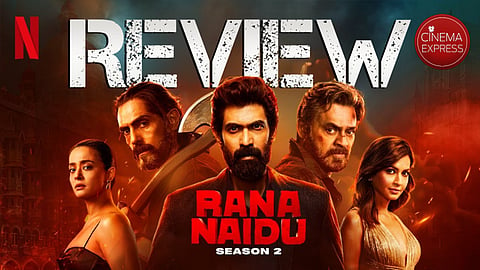Rana Naidu Season 2 Review: Rana Daggubatti and Venkatesh’s second coming is sloppy
Rana Naidu Season 2(2 / 5)
Whenever in a film or a series a character promises “one last job”, a line probably patented by bank robbers, you know how it’s going to turn out. In the first episode of Rana Naidu season 2, the titular character (Rana Daggubatti) says it to his wife Naina (played by Surveen Chawla). More than anything, I sighed under the weight of the expansive history of predictability of this line. The sophomore season is blotted by such cliches. The villain’s seemingly ominous whistle precedes his entry. “It will be fun working with you,” a woman seductively tells our brooding hero. Also, I checked, there are a total of seven seasons of Ray Donovan, the American series from which the Indian version is adapted. So, “last job”, definitely not. You can stop giving me false hopes, Mr. Naidu.
Created by: Karan Anshuman
Starring: Rana Daggubati, Venkatesh, Arjun Rampal, Sushant Singh, Abhishek Banerjee, Surveen Chawla, Rajat Kapoor and Kriti Kharbanda
Rating: 2 stars
Mumbai’s best “fixer” is back to the old grind. His wife might be cheating on him, his brothers find new troubles to get into every day, his daughter is dating a rapper and no matter how much he tries, he can’t outrun his daddy and his issues. A new opportunity arises itself in the form of an industrialist Viraj Oberoi (played by Rajat Kapoor) and his children warring for his throne. There is also an antagonist in the mix: Arjun Rampal as Rauf Mirza, a Lion King’s Scar-coded gangster who has a score to settle with Rana.
There are so many moving parts but the whole machine keeps on clogging. The series takes convenient routes to get out of conundrums. At various instances, the sequence of events can leave you confused, only to be ironed out later with the aid of a flashback. It’s afterthought-writing, done probably to milk the popularity of the first season. There are no surprises. Even when things are falling apart around Rana, you know he is going to make it. Some clumsy manoeuvre, like planting evidence (which will of course be shown in a hazy flashback) and he will be the last man laughing.
Character developments drown in the sea of the generic. Cases in question are Surveen Chawla as Rana’s wife Naina and brothers Tej (Sushant Singh) and Jaffa (Abhishek Banerjee). Naina doesn’t get anything more than a short-lived affair to proceed her story. Tej goes to jail but gets out soon enough while Jaffa somehow manages to woo a girl, even when his first move involves looking at her from behind blinds and touching himself. Rampal, even with his thick bambaiya accent, shows promise in the beginning but his antagonist is soon left in the lurch, only waking from his slumber to ambush Rana and his family. You can trust Rajat Kapoor to satisfactorily play a scheming industrialist, full with dapper high necks and shades, holding on to his own in an otherwise crumbling screenplay. Kriti Kharbanda makes her series debut as his ambitious daughter Alia Oberoi, who wants to make a space for herself in an otherwise male-dominated world. A rich girl with father troubles? Perfect partner in crime for Rana.
In an otherwise dull palette, Venkatesh as Rana’s father Naga Naidu is the real pop. With his Hyderabadi references (“You gave me salad, where is the biriyani?”) and his penchant to fall into hilarious situations, he is a hoot. While season 1 had the father-son rivalry at its centre, this time Venkatesh’s Naga is more of a wild card, entering scenarios at his whim. For all the drab seriousness, I enjoyed the flimsy fun Naga provided in the series. I might binge a spin-off.
With its second season, Rana Naidu seems to have fallen onto Netflix’s factory-line of not-thought-through sequels. It seems to be content being at the surface level, just assembling narratives together, hoping to leave an impact if its lucky. The series dawdles, venturing into pointless subplots, somehow making it to a climax. It’s often tough to deliver a satisfactory end, for both filmmakers and reviewers. Towards the end of the eight-episode show, a character shoots himself in the head. It’s a low hanging fruit, I know. But for a series like this, it can’t get more poetic.

